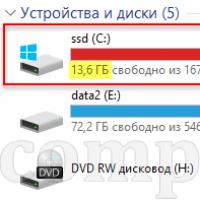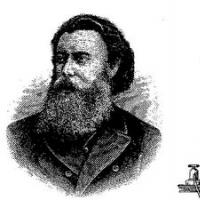Million pixels. Alex Tew's million friends. The main thing is the money idea
What does an ordinary student who always lacks money do? Going to work? Asks your parents? Alex Tew, a student from the UK, also faced this age-old question in 2005. And so he thought and thought ... and invented! 
On August 26, 2005, Alex Tew launched a resource on the Internet called Milliondollarhomepage. The idea was both crazy and simple: in order to make a million dollars, you have to sell something insignificant at a ridiculous price. For example, pixels on the screen. There are a lot of them! And it is best to sell them at a price of $ 1 apiece. Total: 1 million pixels = $ 1 million.

But selling at 1 pixel is somehow frivolous. So Alex decides to divide all pixels into 10X10 squares. This became the minimum purchase size.
This is what the site looked like before the pixel sales started:

The media got interested in the original idea of selling pixels. And although the site was initially unknown and, of course, there were no visitors on it either, the media picked up this topic, creating a real information trend. After just three months, a quarter of all pixels were sold out. Various companies offered Alex to cooperate for the ownership of the coveted pixels. But the young entrepreneur remained true to his idea - 1 pixel for $ 1. The last 1000 points were an exception. For them, he has prepared a much more interesting fate: put up on eBay. The auction lasted 11 days. The last thousand pixels cost the buyer $ 38,100. Only 138 days have passed since the launch of the site, and the owner's total income was more than a million dollars.
Pixels that are closer to the top were bought first:

Eight years later, the adventurous Milliondollarhomepage project still exists, but is in a "frozen" state. Where do the new pixels come from ?!
Many want make money online on your website... Do you think this is impossible?
Not at all, because even simple students succeeded :) You just need an idea!
The British student made more than one million dollars on his website. Student Alex Tew created a website milliondollarhomepage.com where he sold pixels, asking only $ 1 for each pixel.
The student was not mistaken, as in a week he sold the first thousand pixels. “In theory, I thought people would use my page for advertising,” Alex said.
So, in January 2006, an auction took place, at which he sold the last thousand pixels for $ 38,100.
How a British student made money
$ 1,000,000 on his website
Alex Tew created the site in August 2005, the essence of the project is simple - the main page of his site was divided into 10 by 10 pixels, a total of 1,000,000 pixels, pixels were sold in 10 by 10 squares for $ 100.
![]()
Alex Tew created the milliondollarhomepage.com website on August 26. and earned $ 253 thousand in a month and a half.
The essence of the project is simple: the main page contains a grid of 10 thousand squares. Each of them is 100 pixels in size. Thus, there are exactly 1 million pixels on the page.

You can go and see for yourself (the site is still live and working) http://milliondollarhomepage.com/
Alex decided to sell a place in this grid to everyone. One pixel was worth one dollar, and, accordingly, one square was $ 100. Three days later, the first buyer appeared who bought 4 squares for $ 400.
"This is the easiest money in my life," - wrote Alex in a diary on his website.
The client was free to use the purchased pixels at his own discretion, but the most logical thing was to place an advertisement there.
As a result, the page is a motley picture of banners of different sizes. By the way, finding familiar sites is very exciting.
All pixels have already been sold, apparently forever. While creating the site, Alex guaranteed that it will last at least five years, but apparently, the period will be much longer.
The idea turned out to be interesting to the press, the resource quickly gained popularity, and closer to 100% filling, the demand for pixels became downright feverish.
But the real explosion in sales was twice: the first explosion was when the British media became interested in Alex, the second when the American media became interested in him.
He was interviewed by the most popular newspapers in England (such as The Wall Street Journal), and after that, in two weeks, Tew sold 40,000 pixels. He set aside the last thousand for the auction, at which he sold for $ 38,100, thereby making a profit of $ 37,000 more than originally planned.
Alex hoped to earn some cash to help his parents pay for his studies ($ 37,000 over 3 years).

While creating such a site, Alex also indicated that he would like to buy new socks. Considering that the number of those wishing to purchase pixels would grow like a snowball, he sent a link to the site to all his friends, they, in turn, to their acquaintances, and so on.
The idea of the MillionDollarHomepage website is so obvious, and the execution is so primitive that it’s even a shame: the entire site consists of a single 1000x1000 page, divided into 10 thousand squares of 10x10 pixels each.
So, hoping to make only about 40 thousand dollars to pay for college. Alex has earned a tidy sum! Prior to that, he worked as a web designer on the Internet, creating websites and looking for income, like many other netizens.
According to Tew, his success lies in finding an idea that is simple to understand and easy to bring to life, giving it a catchy name and promoting it online.
Shortly after the launch of the project, leading British newspapers such as The Guardian wrote about the original site. Information support has led to an increase in the number of visitors. Two weeks after launching the site, Alex said, "I had 200,000 visitors in three days."
By October 1, Alex Tew had already sold 205,100 pixels, earning more than $ 205,000 in 1 month. And as of the morning of October 3, almost 253 thousand pixels had already been bought from him.
The main thing is the money idea
Alex sold the first blocks of 100 pixels to his relatives and friends, and for the first thousand he earned, Alex paid for the placement of a press release on the BBC website.
After the publication of the article, orders went in dozens. In the first month, until the wave of fame died down, Alex sold over 300 thousand pixels. So, he bought a bunch of socks after the first hundred thousand dollars :-)
In the "peak" days after the launch of the information wave, the site traffic reached several hundred thousand unique visitors.
Shortly after the completion of sales of points, the story got into the feed of the Reuters agency, and this time the agency worked for free. Here is a video of his interview with Reuters.
As Alex wrote in his blog, the resource's traffic jumped to 231.475 thousand unique visitors per day, and later reached 25 thousand per hour.
Alex earned his honest million in three months.
The new Pixelotto project (http://pixelotto.com/) is even more ambitious. Here Alex will be selling pixels not one at a time, but two dollars.
At the same time, a lottery has been organized for site visitors: by clicking on the "lucky pixel", you can win a million, writes TechCrunch. The site has not opened yet.
But most likely, such a resounding success cannot be repeated.
Russian sites clones of ideas for 1,000,000
Russia also has a full clone site www.milliondollarhomepage.ru, pixels here are sold for a ruble. Things are not going very well there, about 60 thousand pixels have been sold, although the project is unlikely to earn a million rubles soon.

Another clone that tries to use a popular business idea - Site http://best.100wmz.com
Well, the laurels of Alex Tew, who launched the "million dollar site", haunt the fans of quick money on the Internet. The project has many clones, among the authors of which you can find our compatriots.
One resourceful young girl Natasha from St. Petersburg (her website http://isellbody.com) has guessed to offer her own body as an advertising platform, both on the Internet itself and beyond it.

The girl still has a moderately attractive body, which can act as an additional incentive for advertisers. At the bottom of the page on her site Isellbody.com is a slightly blurry photo of this naked girl, advertising space is selling for $ 1 per millimeter.
The minimum plot for sale - 100 millimeters - will cost buyers $ 100.
There, at the request of the client, any drawing, logo, photograph can appear, which will be applied both to an online picture and to a living girl's body in the form of a tattoo.
Big buyers are promised bonuses from the modest Natasha: she can descend upon the advertiser and spend her holidays in his country.
She completely copied the business model of the project from Alex's famous website.
Natasha is not alone in her desire to make money in this way.

There are girls who are also trying to draw their photos and sell advertising space. But, alas ... it no longer brings profit.
===================
Another new resource MyMillionDollarPictures.com, which copied the idea of a million-dollar site, was launched with huge ambitions, but how else? The goal of the author of the project is to earn a million dollars by selling photos on the site for 1 dollar.

Moreover, the author of the million-dollar site has set very specific deadlines for achieving this specific goal, motivating users to actively buy free space for their own photos and invite their friends and acquaintances to do the same.
Upon the expiration of the cherished period, which will come on New Year's Eve, the author of the MyMillionDollarPictures.com project promises all users of the site who have already bought places for their own photos, happiness in the form of a beautiful photo mosaic with all the photos of participants on the site, as well as a prize of $ 10,000 to the winner to be chosen from the participants in the MyMillionDollarPictures.com project.
Plus, in order not to look completely mercantile in the eyes of the project participants, the author of the resource MyMillionDollarPictures.com declares (let's pretend we believed him) about a good goal - the opening of a charitable project, on which this money will be spent.
The concept of a million dollar site is pretty simple, but feasible. What is one dollar for a little fame on the Internet, especially since users buy dollar gifts on Facebook every day without any problems.
The success of this simple idea is quite predictable, although it is unlikely that you will be able to make a million dollars.
Go for it, friends! Just to really make money- ideas should be fresh and original ... you won't be able to make millions on the old!
Earning money on the Internet without investment - lessons on how to make money
Make money on the Internet - How you can make money on the Internet
History of the Million Dollar Homepage and its creator Alex Tew
The editor of the Quartz website, at the request of the readers, analyzed the once popular site milliondollarhomepage.com - and it turned out that over the next eight years, a fifth of the links “broke” and did not lead anywhere. TJournal recalled how the Internet site appeared and "blew up", as well as what else its creator Alex Tew was doing.
In 2005, Briton Alex Tew needed money to study at the university. The result of his reflections on the topic "where to get the funds?" became the site milliondollarhomepage.com with a simple mechanics: there are a million (a thousand in width and a thousand in length) pixels, each of which can be redeemed, "painted" in the desired color and made an active link to your page.
Each pixel on Tew's website was worth one dollar, but you could buy at least a block of 10 by 10 points. "I thought it might be something crazy enough to work," the young man recalled in a blog post. "Because I think people love crazy / unusual ideas."
Within three days, he sold the first 400 pixels - "the easiest money I've ever made." Tew hoped that the unusual site would allow him to recoup the cost of his studies at least a little. But a month after the launch, he earned $ 37,000. This money was enough to pay for three years of tuition for a business management course.
Tew began his studies, but in January 2006, after finishing his first semester, he left the university. The popularity of the Million Dollar Homepage grew like a snowball: if at first the news about it was passed by word of mouth, then soon major media outlets such as CNN and MSNBC began to write about the site. And such giants as Yahoo and The Times have bought advertising sites on Tew's page.
Initially, the young man spent £ 50 on the purchase of a domain (about $ 83 at the current exchange rate). In the future, he had to invest another 40 thousand dollars in the stability of the resource, and also hire a press secretary in the United States.
On January 1, 2006, Alex Tew put up the last thousand pixels for auction on eBay. A few days later he sold them for $ 38,100, thus earning $ 1 million and $ 37,100 from his playful craft.
The Tew website, of course, has a large number of clones, including in Russia. But they were not very successful. As the student himself explained, "This idea only works once and is based on novelty."
To date, Quartz analysis shows that 22 percent of the pixels (worth $ 221,900) on the Million Dollar Homepage lead to non-existent pages. In the animation below, they are marked in purple.
The publication refers to an old study, according to which the rate of "death" of links on the Internet stabilizes over time. Therefore, over the next 8 years, less than 22 percent of the pixels should “die” on the Million Dollar Homepage.
What about Alex Tew himself? In December 2006, shortly after the million-pixel story died down, he launched a new variation of his site, Pixelotto. This time, each advertising point cost two dollars, therefore, Tew should have earned two million at once.
The originality of Pixelotto was that the site was at the same time a lottery - the user who clicks on the correct ad was promised half of the amount earned, that is, a million dollars. However, the Internet did not fully appreciate Tew's self-copying, so two million did not accumulate. In January 2008, he shut down the site. The winner, one Moguche from Kenya, received $ 153,000.
There have been other attempts by Alex Tew to launch viral products. For example, the humorous resource PopJam, where users voted for the best materials (closed in 2010).
In 2011, he moved to San Francisco and decided to focus on products that not only do not require users to pay, but also vice versa - that force them to do nothing at all.
In January, he launched Do Nothing For 2 Minutes, which encourages visitors to put their mouse and keyboard aside and just enjoy two minutes of the sound of the sea. It is necessary to slightly move the cursor, as the "mission" is considered failed, and the counter starts from the beginning.
British student Alex Tew earned a million dollars in six months through his personal website MillionDollarHomepage.com. In 2005, pondering how to help his parents pay for his studies, Alex decided to sell a million pixels on the home page of his website for $ 1 per pixel. He hoped that buyers would display their logos or advertisements on the purchased sites, with the option of following a hyperlink to their own sites. But since the pixel size is too small, Alex combined them into 10x10 pixel blocks, resulting in a block price of $ 100. Alex spent only € 50 on his plan, which he paid to register the domain name.
The site was launched on August 26, 2005, with Alex's main goal to sell all the pixels on the home page, thus generating $ 1 million in revenue. Alex submitted the first block at the lowest price to one of his friends, earning the first $ 100. Three days after the site went live, another friend of Alex bought 400 pixels and placed an advertisement for his music site on them. After two weeks of work, a total of 4,700 pixels were purchased by Alex's friends and family. By the end of September, Alex had received $ 250,000, and the number of unique visitors reached 65,000 a day. In early October, the number of unique visitors increased to 100 thousand per day, and on October 26, two months after the start of the project, more than 500,900 pixels were sold to 1,400 customers.
The last thousand pixels were sold in January 2006 on eBay for $ 38,100. The auction lasted ten days, and although there were bids of up to $ 160,000, many of the bidders refused to pay their bids or the bids were canceled as a hoax. For six months, the site brought its owner an income of 1,037,100 dollars, after paying off expenses, paying taxes and donations to "The Prince" s Trust, Alex received 700 thousand dollars in net income.
Buyers include: Bonanza Gift Shop, Book of Cool, Panda Software, British Schools Karting Championship, Wal-Mart: The High Cost of Low Price, The Times, Cheapflights.com, Orange, Schiffer Publishing, Tenacious D, Rhapsody, GoldenPalace. com, 888.com and other online casinos, Independiente Records, Yahoo !, as well as many private firms and businesses offering various services, and even online dating sites.
Alex promised his clients that the site will remain online for at least five years - that is, at least until August 26, 2010. But on January 7, 2006, three days before the last thousand pixels were auctioned, Tew received an email threatening that the site would be hacked if Alex didn't pay the $ 5,000 ransom. He ignored these demands, considering them someone's joke, and as it turned out, in vain. Soon, the threat was carried out and the site remained inaccessible to visitors for a week. After the website was restored to normal operation, a threatening letter was sent to Alex again, only now the ransom was raised to $ 50,000. Criminal Investigation Departments of the British police and the FBI were involved in the investigation of the extortion case, the whereabouts of the threats were never established, but, according to investigators, the attacks were carried out from Russia.
 Analysis of legacy code when the source code is lost: do or not?
Analysis of legacy code when the source code is lost: do or not? Windows does not load after installing updates Laptop does not turn on after updating windows 10
Windows does not load after installing updates Laptop does not turn on after updating windows 10 How to crack a password: an overview of the most common methods
How to crack a password: an overview of the most common methods Disable encryption on the tablet
Disable encryption on the tablet Creation of a light bulb. Edison's light bulb. Who Invented the First Light Bulb? Why did Edison get all the glory? Incandescent lamp device change history
Creation of a light bulb. Edison's light bulb. Who Invented the First Light Bulb? Why did Edison get all the glory? Incandescent lamp device change history How to quickly find your phone on google, wherever it is
How to quickly find your phone on google, wherever it is The electric incandescent lamp was invented in russia
The electric incandescent lamp was invented in russia